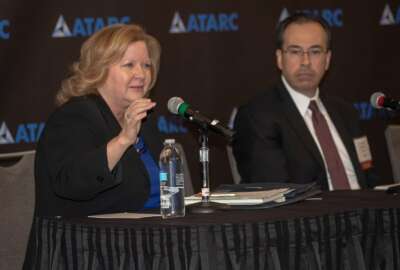
This bill would pay colleges and universities to offer more data science
Rep. Don Beyer (D-Va.) recently introduced a bill to boost data science education. It would offer up to $10 million in grants to schools from nursery school to...
Rep. Don Beyer (D-Va.) recently introduced a bill to boost data science education. It would offer up to $10 million in grants to schools from nursery school to four-year colleges. Is it a good idea? For one answer, the Federal Drive with Tom Temin with Laura Albert, a University of Wisconsin Professor of Industrial and Systems Engineering.
Interview transcript:
Tom Temin This bill then seeks to improve data literacy. I guess, my question is, if data literacy is such an important field, wouldn’t schools and colleges offer it anyway?
Laura Albert They do, but we need more of it. Data is here to stay. Our economy is driven by data, and today’s students need to be prepared to work with data, drive decisions, drive innovation in all sectors, not just the data sector. What’s unique about this bill, is that it expands that data education beyond just math to help make those connections across different fields, for example, across into social studies. And this will really help teach students the skills they need to be data literate, but also maybe spark an interest in pursuing a data driven career.
Tom Temin And I’d like to define that term data literate, because you could be data literate in understanding the difference between a cell in an Oracle database and a cell in some other database, and what the compatibilities are and how to make them work in a same application together. That’s one form of data literacy. The other form is, what is the problem I’m trying to solve and what information do I need to get the answer I’m looking for? That’s a different level of data literacy. What should this best aim at? Do you think?
Laura Albert The second one that you mentioned, is thinking really broad about data. The ways that we’re coming into contact with data in our everyday lives, our data visualizations, we see a lot of charts on the news even and in the newspaper, and understanding how to use numbers to help us understand the bigger picture and to drive decisions. So it’s not necessarily programing and getting into spreadsheets, but we want to see some of that later on. In K-12, sometimes it just starts with understanding and telling stories and seeing visualizations.
Tom Temin Because people that have a point of view about this or that topic often, the old story statistics and lies and so forth. Would data literacy help people understand when they’re reading propaganda, and have the ability to say, well, they only took a sample from point A to point B, and really the phenomenon went to point D. And we need a bigger base of data to really understand in contrary to what I’m reading here, that kind of literacy. How do you get that to people?
Laura Albert Absolutely. That is something that will be a nice side effect of data literacy. A lot of working with numbers, especially statistics, really focuses on trying to figure out what happened. And we have these clues that are in data. And the data are often numbers, but not entirely numbers. And we use those clues to sort through what happened. And that can help us tackle topics such as misinformation or understanding, assumptions that may or may not make sense. That led to an analysis that drew certain outcomes. And the skills can be quite broad.
Tom Temin All right. And then there’s the issue of math education, itself. If you look at a city like Philadelphia, Baltimore, Washington, D.C., Chicago, these great big educational machinery, let’s say. And yet, 50, 80%, depending on the city of the graduates of high school, are barely, charitably, only 20%. In some cases, you could say charitably, math literate. And so do you think that the bill should, perhaps or the effort should be expanded to teaching math better? Because data doesn’t do anything unless there’s math to tie it together.
Laura Albert These are really synergistic efforts. And I will say that math education at the K-12 level has gotten a lot of attention in the past few decades, and we obviously have a lot more work to do, in particular in regards to COVID. One of the things we’re seeing in higher ed is that math education was interrupted during COVID, and we’re seeing that students aren’t quite prepared for taking the next level of math. And this is ripple effects that we’re seeing at the universities, but at all levels. But that’s really a sidetrack. And back to your question, is that we need great math education and we need good data education, and students need to see some of these topics outside of math, and that’s going to help strengthen some of their education. And that’s really going to help our economy and put us in the best position to have a strong economy in the future.
Tom Temin We’re speaking with Dr. Laura Albert. She’s a professor of industrial and systems engineering at the University of Wisconsin. And by the way, you are part of a consortium of people like you that think about these things at a policy level, correct?
Laura Albert Absolutely. I’m the president of informs. It stands for the Institute for Operations Research and Management Sciences. And it’s mostly professors, but also professionals that have a background in data analytics and using that to drive decisions. And my background is industrial engineering, but we have folks from a variety of different academic backgrounds, including management, science, applied math, various engineering disciplines and computer science. And we’re really interested in solving problems in a data driven manner. And the need for this and the opportunities for us has grown and we want to help the next generation come up behind us.
Tom Temin And in the release and in some of the text of that bill, it does mention, as I said at the top. From preschool to four year colleges and universities eligible for these grants, not a ton of money. $10 million nationwide it’s a nice touch. But, I guess the question is, you can’t get a grant to do the same thing in university, that you can get a grant to do the same thing in nursery school. And is there something that can be taught at this level to the very young, do you think?
Laura Albert Yes. As a parent, I’m always amazed. I always study the education that happens at that young age. And some of the work they do with data is polling students in the class and making visualizations, histograms, charts, the type of thing that we see on the TV news every night. And what’s fascinating to me as a college professor is that it’s also kind of developmentally appropriate to start with some of those data topics and preschool. And they can see that chocolate ice cream is maybe preferred to vanilla. And it’s pretty exciting as a professor to see where it all begins, and starting early is advantageous.
Tom Temin And maybe one of the crucial questions for this bill is, who makes the decision? As to who gets grants? What do you think would constitute a good proposal to get a grant under this bill from Don Beyer (D-Va.), the Data Science and Literacy Act.
Laura Albert That’s probably above my pay grade. You pointed out that it’s only $10 million. And I’m hoping that this is a bipartisan effort, and it should be, because this is really a bipartisan issue. And I hope that this is one of many efforts that will come out of the federal government to support data literacy. So I’m hoping that there’s a lot more opportunity in the entire education ecosystem for data.
Copyright © 2025 Federal News Network. All rights reserved. This website is not intended for users located within the European Economic Area.
Tom Temin is host of the Federal Drive and has been providing insight on federal technology and management issues for more than 30 years.
Follow @tteminWFED
Related Stories





